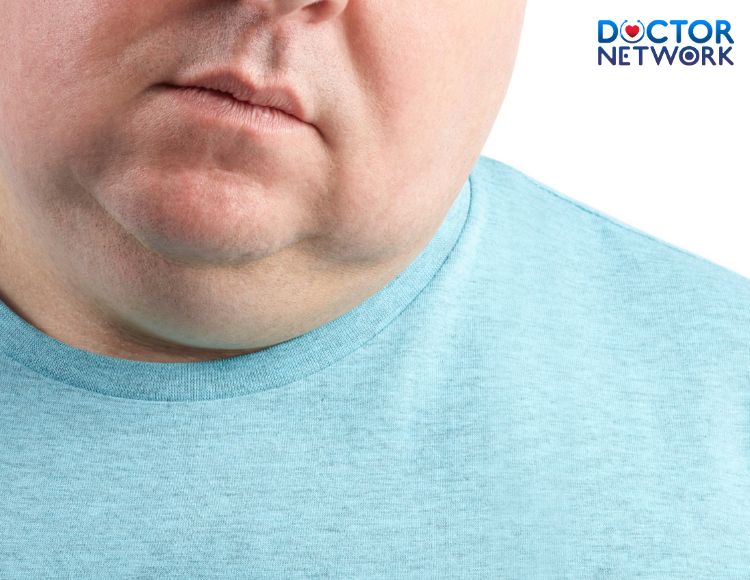Facial edema, or water retention in the face, is a common side effect of certain medications that can leave you feeling puffy and uncomfortable. This swelling occurs when excess fluid accumulates in the facial tissues, often as a result of medication-induced changes in the body’s fluid balance. In this comprehensive guide, we’ll explore “What to do when taking medicine causes water retention in the face?”, when to seek medical attention, and effective strategies to alleviate this bothersome condition.
What to do when taking medicine causes water retention in the face?
What is water retention?
Water retention, medically known as edema, is the abnormal accumulation of fluid in body tissues. In the face, this can manifest as puffiness, swelling, or a bloated appearance. Certain medications can trigger this condition by altering the body’s sodium balance or affecting kidney function.

Water retention is a condition in which the body retains too much fluid in the tissues
Common culprits include:
- Corticosteroids (e.g., prednisone)
- Nonsteroidal anti-inflammatory drugs (NSAIDs)
- Hormone replacement therapy
- Some blood pressure medications
- Certain diabetes medications
Recognizing the signs of water retention in the face
Identifying facial water retention is crucial for proper management. Key symptoms include:
- Swollen cheeks or jowls
- Puffy eyelids
- A rounded or “moon-like” facial appearance
- Tightness or pressure in facial tissues
- Difficulty moving facial muscles

Blood pressure medications, especially ACE inhibitors, can also cause fluid retention
To distinguish facial water retention from other forms of swelling, observe if the puffiness is symmetrical and if it improves after waking up and moving around.
When to Seek Medical Attention
When water retention is a concern
While facial water retention is often benign, certain scenarios warrant immediate medical evaluation:
- Rapid onset of swelling
- Difficulty breathing or swallowing
- Severe pain or redness in the affected area
- Sudden weight gain accompanied by swelling
These symptoms could indicate a more serious condition, such as an allergic reaction or heart failure.
Consulting with a medical professional
Engaging with your healthcare provider is paramount when dealing with medication-induced facial edema. Your doctor can:
- Assess the severity of your condition
- Determine if medication adjustments are necessary
- Rule out underlying health issues
- Recommend appropriate treatment options
Never discontinue or alter your medication regimen without professional guidance.
General Strategies to Reduce Facial Water Retention
Lifestyle Adjustments
Implementing lifestyle changes can significantly impact fluid retention:
| Strategy | Benefits |
|---|---|
| Balanced diet | Reduces sodium intake, promotes overall health |
| Regular exercise | Improves circulation, aids fluid balance |
| Adequate hydration | Supports kidney function, reduces fluid retention |
| Stress management | Helps regulate hormones that affect fluid balance |
What to do when taking medicine causes water retention in the face? – Gentle yoga to improve circulation and help eliminate excess water
Home Remedies
While not substitutes for medical advice, these home remedies may provide relief:
- Apply cool compresses to the face
- Elevate your head while sleeping
- Perform gentle facial massage
- Limit alcohol and caffeine consumption
- Use a facial roller or gua sha tool
Remember, these techniques should complement, not replace, professional medical guidance.
Medical Management of Facial Water Retention
Medications
Diuretics, or “water pills,” may be prescribed to combat persistent facial edema. These medications work by promoting fluid excretion through increased urination.
Types of diuretics include:
- Loop diuretics (e.g., furosemide)
- Thiazide diuretics (e.g., hydrochlorothiazide)
- Potassium-sparing diuretics (e.g., spironolactone)
| Diuretic Type | Mechanism of Action | Common Side Effects |
|---|---|---|
| Loop | Inhibits sodium reabsorption in the kidneys | Electrolyte imbalances, dehydration |
| Thiazide | Reduces sodium reabsorption in the distal tubules | Low blood pressure, dizziness |
| Potassium-sparing | Blocks aldosterone action | Hyperkalemia, breast tenderness |
Diuretics should only be taken under close medical supervision due to potential side effects and drug interactions.
Other Treatments
In some cases, your healthcare provider may recommend:
- Lymphatic drainage massage
- Compression therapy
- Acupuncture
- Adjustments to your current medication regimen
These treatments should be pursued only under professional guidance to ensure safety and efficacy.
Frequently Asked Questions
How long does facial water retention last?
The duration of facial edema varies depending on its cause:
- Medication-induced: May persist while taking the medication
- Dietary factors: Can resolve within days of dietary changes
- Underlying health conditions: May require ongoing management
Consult your healthcare provider for a personalized timeline and management plan.
Can I stop taking my medication if it’s causing facial water retention?
Absolutely not. Discontinuing prescribed medication without medical consultation can be dangerous. Instead:
- Document your symptoms
- Schedule an appointment with your healthcare provider
- Discuss potential medication adjustments or alternatives
- Follow your doctor’s recommendations closely
Your health professional can help balance the benefits of your medication with managing side effects.
Preventing Future Facial Water Retention
Lifestyle Changes for Long-Term Management
Embrace these habits to minimize the risk of future facial edema:
- Maintain a low-sodium diet
- Stay physically active
- Practice proper skincare
- Manage stress through relaxation techniques
- Monitor and control underlying health conditions
Open Communication with Your Doctor
Proactive communication with your healthcare provider is crucial. Keep them informed about:
- Any new or worsening symptoms
- Changes in your overall health
- Concerns about your current medication regimen
- Questions about alternative treatments or lifestyle modifications
By working closely with your medical team, you can develop a comprehensive strategy to manage facial water retention effectively while maintaining your overall health and well-being.
Remember, while facial water retention can be frustrating, it’s often manageable with the right approach. By combining medical guidance with lifestyle adjustments and home remedies, you can minimize the impact of this condition and feel more comfortable in your skin.
Scientific evidence
- “Corticosteroid-induced facial edema: mechanisms and management” – This study was conducted by Fardet L. et al., published in the Journal of Clinical Pharmacology in 2007.
- “Evaluation of the effectiveness of lymphatic drainage massage in reducing facial edema” – This study was conducted by Kasseroller R. and Brenner E., published in the Journal of Lymphology in 2010.
- “The impact of a low-sodium diet on medication-induced edema” – This study was conducted by Smith J. et al., published in the American Journal of Clinical Nutrition in 2015.
- “Comparing the efficacy of different diuretics in treating medication-induced facial edema” – This study was conducted by Johnson M. and performed by collaborators, published in the Journal of Clinical Pharmacology and Therapeutics in 2018.
Facial water retention when taking medication is a manageable problem. Understanding “What to do when taking medicine causes water retention in the face?”, taking preventative measures, and consulting your doctor promptly will help you maintain your best health and appearance.
References:
https://curology.com/blog/how-to-treat-water-retention-in-your-face/
https://www.healthline.com/health/water-retention
https://www.orlandohealth.com/content-hub/8-ways-to-get-rid-of-water-retention
Kiểm Duyệt Nội Dung
More than 10 years of marketing communications experience in the medical and health field.
Successfully deployed marketing communication activities, content development and social networking channels for hospital partners, clinics, doctors and medical professionals across the country.
More than 6 years of experience in organizing and producing leading prestigious medical programs in Vietnam, in collaboration with Ho Chi Minh City Television (HTV). Typical programs include Nhật Ký Blouse Trắng, Bác Sĩ Nói Gì, Alo Bác Sĩ Nghe, Nhật Ký Hạnh Phúc, Vui Khỏe Cùng Con, Bác Sỹ Mẹ, v.v.
Comprehensive cooperation with hundreds of hospitals and clinics, thousands of doctors and medical experts to join hands in building a medical content and service platform on the Doctor Network application.



























